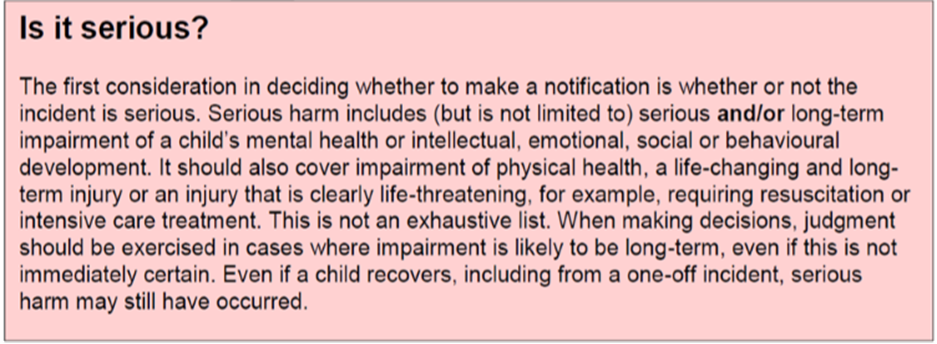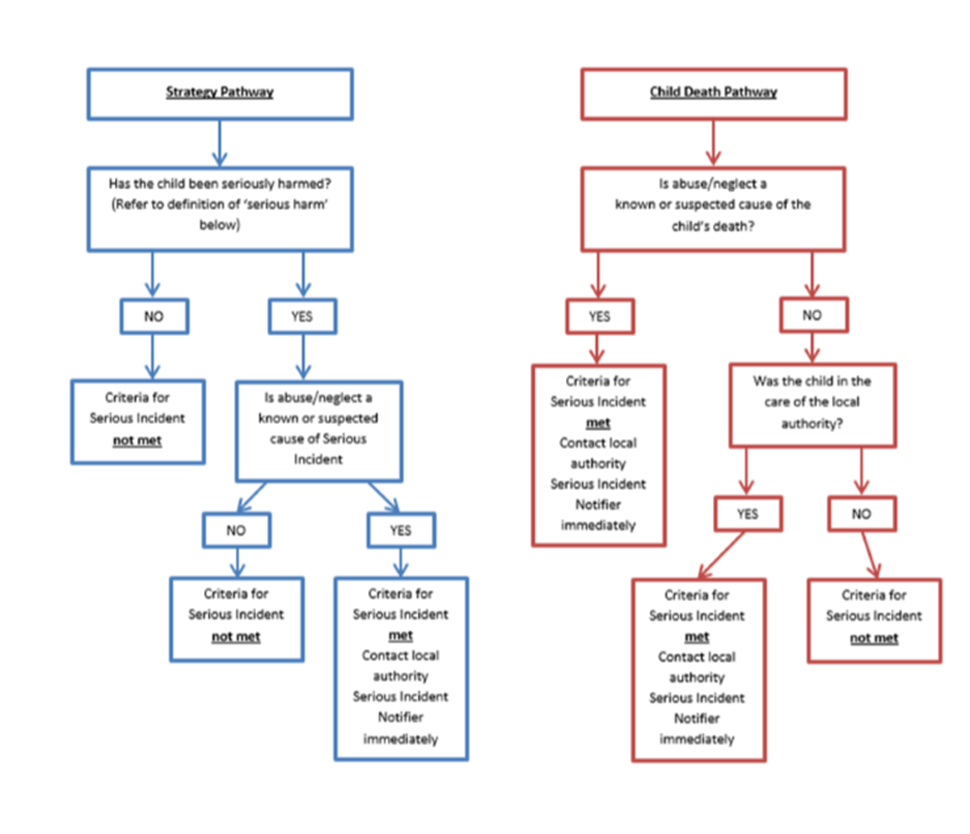
Serious Child Safeguarding Incidents, Rapid Reviews and Child Safeguarding Practice Reviews
Working Together to Safeguard Children 2018 (Chapter 4) outlines how safeguarding partners must make arrangements to identify and review serious child safeguarding cases which, in their view, raise issues of importance in relation to their area. The guidance outlines the processes for identifying serious child safeguarding cases, conducting Rapid Reviews, making notifications to the Child Safeguarding Practice Review Panel and the commissioning and publication of local Child Safeguarding Practice Reviews (CSPR’s), where required.
Serious Child Safeguarding Incidents and Notifications
The Local Authority has the duty to notify the Child Safeguarding Practice Review Panel of any serious child safeguarding incident in their area. A serious incident is where abuse or neglect of the child is either known or suspected and the child has died or has been seriously harmed (16C (1) of the Children Act 2004 (as amended by the Children and Social Work Act 2017)).
Across Tees it is expected that any serious incident will be identified via one of two pathways:
- During the CDOP process where a child has died or is expected to die in the following days, professionals will review the incident and consider whether abuse or neglect is the known or suspected cause; reaching a decision on whether the criteria for a serious incident notification has been met;
- During safeguarding procedures where a child has been seriously harmed, professionals will convene a strategy. The incident will be reviewed and consideration will be given as to whether abuse or neglect is the known or suspected cause; reaching a decision on whether the criteria for a serious incident notification has been met.


Notifications must always be made if abuse or neglect is a cause of, or a contributory factor to, the serious incident, or where it is suspected. However, where the family is known to Children’s Social Care because of a recent incident or current concern about abuse or neglect and where there has been for example a suicide or unexplained death, professionals should also consider the incident as serious.
Where the criteria is believed to have been met, a nominated professional (from the strategy or CDOP meeting - usually a Local Authority representative) should be tasked with informing the Local Authority’s Serious Incident Notifier. This can be done by submitting the locally agreed Serious Incident Form to:
Hartlepool: leanne.stockton@hartlepool.gov.uk
Middlesbrough: Dawn_Alaszewski@middlesbrough.gov.uk
Redcar and Cleveland: Victoria.McLeod@redcar-cleveland.gov.uk
Stockton-on-Tees: nicole.wilson@stockton.gov.uk
The Local Authority must then notify the National Panel within five working days of becoming aware of the incident. They should also inform the relevant Child Safeguarding Partnership of the incident / notification. Where a looked after child has died, the local authority must also notify the Secretary of State and Ofsted; whether or not abuse or neglect is known or suspected.
The Rapid Review
Once the Safeguarding Partnership are aware that a Serious Incident Notification has been made, they will commence the Rapid Review process. Safeguarding Partners have 15 working days from the date of notification to informing the National Panel of the Rapid Review decision. The details of the incident / case will be shared with the key Safeguarding Partnership representatives; who will become the Rapid Review panel members. The details will also be shared with all involved agencies and chronologies / summary of involvement will be requested.
Attendance at the Rapid Review meeting will be made up of the Rapid Review panel (Safeguarding Partnership representatives) and representatives from all involved agencies. These will usually be the professionals who have completed the chronology or summary of involvement for their agency. Front line practitioners, who have had direct involvement with the child and / or family, may also be requested to attend.
During the Rapid Review, agency involvement will be discussed. Panel members will:
- gather the facts about the case, as far as they can be readily established at the time;
- discuss whether there is any immediate action needed to ensure children’s safety;
- consider the potential for identifying improvements to safeguard and promote the welfare of children; and
- decide what steps they should take next, including whether or not to undertake a Local Child Safeguarding Practice Review[1] (CSPR) or recommend that a National CSPR[2] be considered. If the decision is taken not to proceed with a Child Safeguarding Practice Review, members will provide a summary of why it does not meet the criteria.
Following the Rapid Review, a Rapid Review report will be submitted to the National Panel, informing them of the outcome. The National Panel will aim to respond to the submission, to indicate whether or not they agree with the outcome, within 15 working days.
Local Child Safeguarding Practice Reviews
Where the outcome of the Rapid Review has indicated that the criteria for a local Child Safeguarding Practice Review has been met, the Safeguarding Partnership will commission and undertake the review. Safeguarding Partners have 6 months from the date of the decision to complete the review and publish the final report.
The Safeguarding Partnership should commission a lead reviewer, agreeing with the reviewer(s) the method by which the review should be conducted, taking into account this guidance and the principles of the systems methodology recommended by the Munro review. The methodology should:
- provide a way of looking at and analysing frontline practice as well as organisational structures and learning.
- be able to reach recommendations that will improve outcomes for children and should reflect the child’s perspective and the family context.
The review should be proportionate to the circumstances of the case, focus on potential learning, and establish and explain the reasons why the events occurred as they did.
Learning From ‘Near Misses’
Where the criteria for a serious incident notification is not met but professionals believe there is still learning to be gained from a case, a Learning Request Form can be submitted to the relevant Safeguarding Children Partnership for consideration using the email addresses below:
Hartlepool & Stockton-on-Tees Safeguarding Children Partnership - HSSCP@hartlepool.gov.uk
South Tees Safeguarding Children Partnership - STSCP@middlesbrough.gov.uk
The Safeguarding Children Partnership will consider the case and undertake learning activity[3] where appropriate.
[1] A Local Child Safeguarding Practice Review is the responsibility of the Safeguarding Children Partnership and is undertaken where there are issues of importance in relation to their area.
[2] A National Child Safeguarding Practice Review is the responsibility of the National Panel and is undertaken where there are issues of national importance.
[3] Learning activity, for example, may be in the form of audit, case/ facilitated discussions or learning lessons reviews.